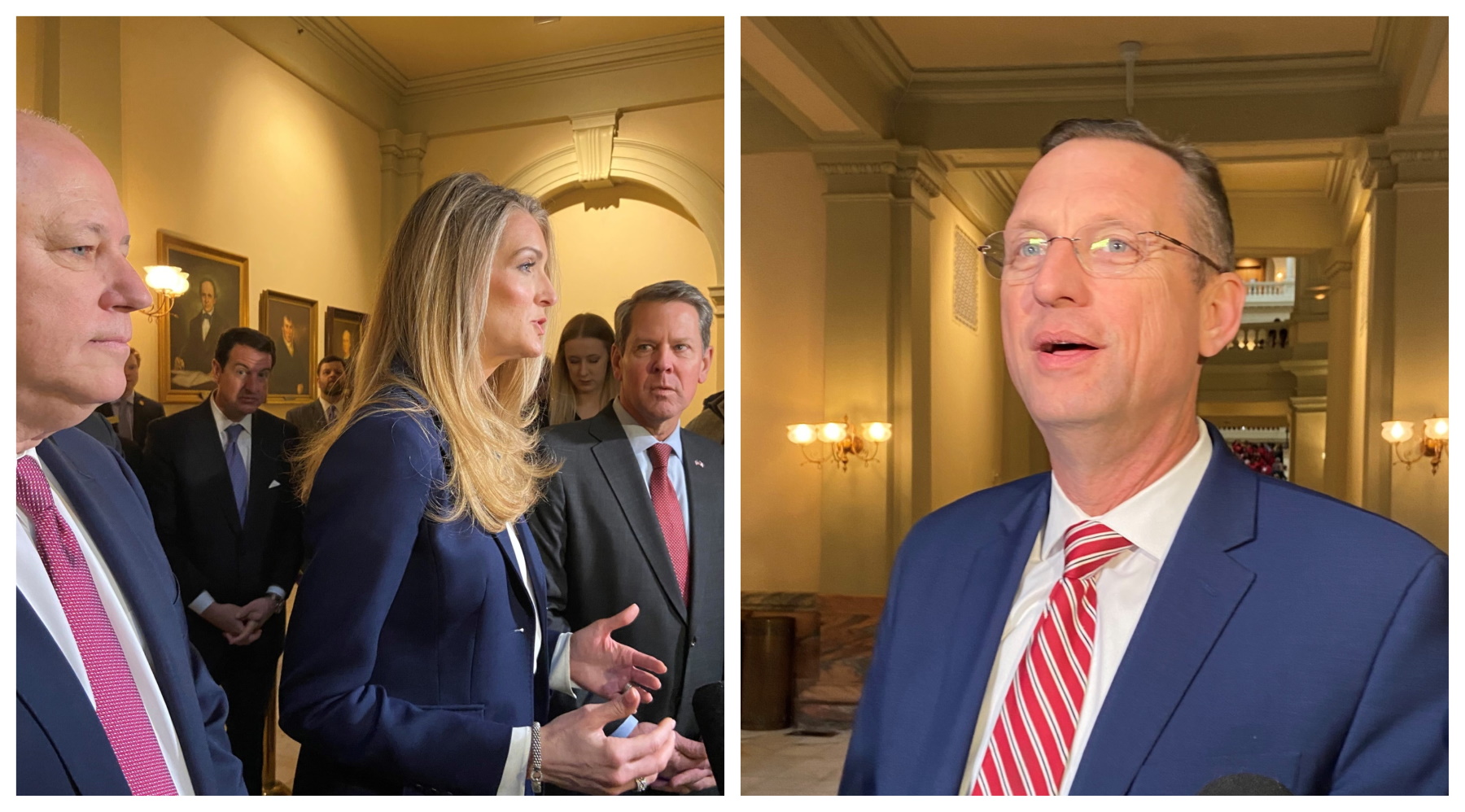Incumbent U.S. Sen. Kelly Loeffler, appointed by Gov. Brian Kemp in December, has 20 challengers. But at this stage in the race, it’d be easy to assume she only has one: fellow Republican Congressman Doug Collins.
The contest will be decided by a “jungle primary,” or a free-for-all election in November without party primaries. Democrats and Republicans will all be on one ballot, which makes Collins’ decision to run especially controversial.
“We really are in unprecedented territory, and so I’m describing it a little bit as political chaos here,” said Heath Garrett, a Republican strategist who has worked for both candidates in the past, but he is staying neutral in this race.
“Both sides have kind of gone into their corners, gone into their trenches and basically are yelling at each other right now.”
The race is likely to be settled in a January runoff, Garrett said, given Georgia’s requirement of 50% plus one vote to win an election. However, there is a risk, “that Republicans end up tearing each other apart and a Democrat, if they were well-funded and if the national environment changed, that Democrat could take a shot at 50% of the vote in November,” he said. “If our party is completely divided and these two candidates beat the living daylights out of each other.”
“At this point in time, just one person voted for Sen. Loeffler and that was Gov. Kemp,” Collins said in defense of his bid. “Now it’s time for the rest of Georgia to have that same vote.” (See a full transcript of the interview with Collins here.)
The battle has ramped up quickly in part because Loeffler has the support of Sen. Mitch McConnell and the National Republican Senatorial Committee (NRSC) in Washington, which started attacking Collins immediately and blacklisted his campaign, prompting him to lose several political consultants.
A recent NRSC ad about Collins said of his decision: “It’s hard to imagine anyone could ever be so selfish and entitled that they would put so much at risk just to advance their own ambitions.”
In a statement released the same morning Collins announced his run, NRSC executive director Kevin McLaughlin said, “The shortsightedness in this decision is stunning. Doug Collins’ selfishness will hurt David Perdue, Kelly Loeffler and President Trump.”
NRSC spokesman Nate Brand recently called Collins’ campaign “a self-serving, spite-fueled, political kamikaze mission that threatens to take down President Trump, the Republican majority in the United States Senate, two Senate seats and multiple House seats.”
“I think we’ll show that there is a difference in the swamp protecting one of its own and then having that swamp rise up against someone who had been working hard up here,” Collins said of the dynamic.
The intra-GOP dispute “has absolutely raised the Democratic Party’s interest in Georgia, with organization, with mobility, with ad dollars,” Garrett said.
Collins immediately dismisses the argument that his candidacy is giving Democrats an advantage: “This idea that somehow I’m encouraging Democrat response is maybe [because] the Democrats know that I’m the one that can win.”
Alex Floyd, spokesman for the Georgia Democratic Party, asserted Georgia Democrats are “the only winner from Kelly Loeffler and Doug Collins’ bitter multimillion-dollar slugfest.”
Loeffler has pledged to spend $20 million of her own money on the campaign.
“I’m here fighting for freedom, fighting against socialism. And that’s my sole focus,” she said in an interview. “So I’m staying positive. And I know that the investments I’m making in my campaign are also investments in freedom.” (See the transcript of the full interview here.)
This conflict has been bubbling for months, and President Trump has been at the center of it from the beginning. He and other conservative pundits and politicians lobbied Georgia’s governor to appoint Collins instead of Loeffler last fall.
Collins, a four-term congressman and until recently a ranking member of the House Judiciary Committee, gained a national platform as a fierce defender of the president during the impeachment inquiry.
“Over the past year, I would argue we’ve been one of the most steadfast defenders of the president and still enjoy his confidence and trust because we worked together on so many things,” Collins said.
Trump has not picked a side, but his possible endorsement hangs heavy over both candidates who are both tying themselves closely to him. Both are trying to paint the other as the more “establishment” candidate.
“Whether or not Donald Trump weighs in on this race really is the multimillion dollar question,” Garrett said.
An attack ad from the conservative Club for Growth against Collins refers to him as “DC Doug Collins.”
One of Collins’ attack ads on Loeffler calls her “too swampy for Georgia.”
“As an outsider, just like President Trump was, just like Sen. David Perdue. I’m coming to solve problems and protect our freedom,” Loeffler said.
“I’ve been a job seeker. I’ve been a job creator. I’ve lived the American dream. I know the difference between freedom and socialism.”
Collins has tried to undermine Loeffler’s outsider argument, citing the lobbying influence of her former employer, a company her husband still runs, Intercontinental Exchange Inc. And he argues she is not a longtime Trump ally, given her past political donations to Mitt Romney.
With no signs of slowing down — between this race, the other Senate race for Sen. David Perdue seats and several other competitive congressional seats — “more money is going to be spent in Georgia in 2020 than any other time in GA political history,” Garrett said, estimating between $100 million and $200 million.






